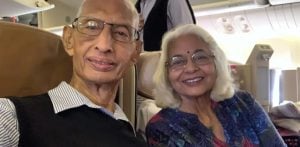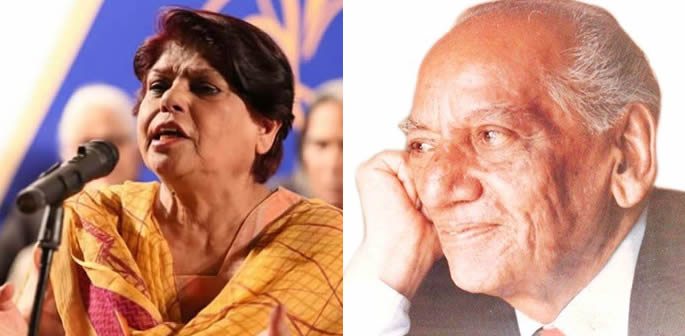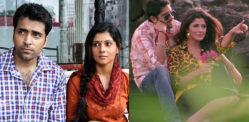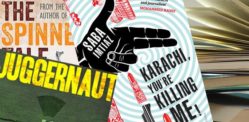If you want a glimpse of brilliance, read Imtiaz Dharker
The roots of poetry in Pakistan go back a long way. One falls in love with sublime words used in such a captivating manner by Pakistani poets.
While many great poets from Pakistan have come and gone, their incredible poetic works remain in our hearts and minds.
There are still some that are successfully alluring people into reading their poems filled with magical words and thought-provoking ideas.
DESIblitz presents eight incredible Pakistan poets that you must read at any cost.
Faiz Ahmed Faiz (1911-1984)

One of the most famous Pakistani poets on this list, Faiz was a revolutionary poet and also one of the most celebrated.
His poetry became immortalised due to his strong resilient mind and determination.
Faiz is often cited as “the greatest poet” from Pakistan. Many poetry lovers become captivated by the world of Faiz’s poetry.
Tonight (Remonstrance)
Do not strike the melancholy chord tonight! Days smoldering
with pain in the end produce only listless ashes …
and who the hell knows what the future may bring?
Last night’s long lost, tomorrow’s horizon’s a wavering
mirage. And how can we know if we’ll see another dawn?
Life is nothing, unless together we make it ring!
Tonight we are love gods! Sing!
Do not strike the melancholy chord tonight!
Don’t harp constantly on human suffering!
Stop complaining; let Fate conduct her song!
Give no thought to the future, seize now, this precious thing!
Shed no more tears for temperate seasons departed!
All sighs of the brokenhearted soon weakly dissipate … stop dithering!
Oh, do not strike the same flat chord again! Sing!
Ahmad Faraz (1931-2008)

One of the greatest modern Urdu poets is undoubtedly Ahmad Faraz. Any true appreciator of poetry will find themselves lost in an enchanted world upon reading Faraz’s poetry.
Have a look at one of his poems and fall in love with Ahmad Faraz’s poetry.
I Cannot Remember
I once was a poet too (you gave life to my words), but now I cannot remember
Since I have forgotten you (my love!), my art too I cannot remember
Yesterday consulting my heart, I learned
that your hair, lips, mouth, I cannot remember
In the city of the intellect insanity is silence
But now your sweet, spontaneous voice, its fluidity, I cannot remember
Once I was unfamiliar with wrecking balls and ruins
But now the cultivation of gardens, I cannot remember
Now everyone shops at the store selling arrows and quivers
But neglects his own body, the client he cannot remember
Since time has brought me to a desert of such arid forgetfulness
Even your name may perish; I cannot remember
In this narrow state of being, lacking a country,
even the abandonment of my fellow countrymen, I cannot remember
Munir Niazi (1928-2006)

Munir Niazi knew the art of making his reader cry. His poetry usually revolved around the true cultures of Punjab.
Niazi is a treat to read if you want to feel the values and simplicity of Punjab. One of his other notable works includes:
Hamesha Der Kar Deta Hun Main
Hamesha der kar deta hun main
Zaruri baat kehni ho
Koi wada nibhana ho
Usay awaz deni ho
Usay wapis bulana ho
Hamesha der kar deta hun main
Madad karni ho uski
Yar ke dharas bandhani ho
Boht dareena raston pe
Kisay se milny jana ho
Hamesha der kar deta hun main
Badaltay mausamon ki ser main dil ko lagana ho
Kisi ko yaad rakhna ho
Kisi ko bhool jana ho
Hamesha der kar deta hun main
Kisi ko mout sy pehlay
Kisi gham sy bachana ho
Haqiqat aur thi kuch
Uss ko jaa kay ye batana ho
Hamesha der kar dayta hun mai
Imtiaz Dharker (born 1954)

Imtiaz Dharker is a winner of the Queen’s Gold Medal for her English poetry.
She is a true picture of modern day Pakistani poets. If you want a glimpse of brilliance, read Dharker.
Taal
This music will not sit in straight lines.
The notes refuse to perch on wires
but move in rhythm with the dancer
round the face of the clock,
through the dandelion head of time.
We feel blown free, but circle back
to be in love, to touch and part
and meet again, spun
past the face of the moon, the precise
Underpinning of stars. The cycle begins
with one and ends with one,
dha dhin dhin dha. There must be
other feet in step with us, an underbeat,
a voice that keeps count, not yours or mine.
This music is playing us.
We are playing with time.
Kaleem Omar (1937-2009)
Kaleem Omar was a gifted English language poet. He was a rare breed of English poets in Pakistan. He sadly didn’t receive the recognition that he deserved.
Read his work and you might cry in agony over his less popularity.
The Troubadour’s Life
The Troubadour’s Life
Such twists and turns of destiny
Such reckonings have I known,
A look here, a moment there,
Absences in autumnal air,
A memory of gilded wings,
Flitting through a secret glade
The feel of snow upon the face
A kingfisher swooping down,
Like iridescence upon a stream
Places to lie back and dream.
Habib Jalib (1928-1993)

Habib Jalib was one of the greatest revolutionary poets of Pakistan.
Even Faiz Ahemd Faiz paid tribute to this legend for his immense contribution in poetry.
Have a peek into one of his works:
To Rakhshinda Zoya
13 April 1981, during a jail visit
She cannot say it, but then
My little one manages to say
Father, come home
Father, come home
She cannot comprehend
Why, in prison, I continue to stay
And not return with her, hand in hand
How should I explain to her
That home, too, is like a prison
Kot Lakhpat Jail
Kishwar Naheed (born 1940)

Kishwar Naheed is known for pioneering feminist poetry in Pakistan.
She fought for women’s rights, earning her Pakistan’s biggest national award – Sitara-e-Imtiaz.
If you want to read about pure grit and determination, read Kishwar Naheed.
The Grass Is Really Like Me
The grass is also like me
it has to unfurl underfoot to fulfil itself
but what does its wetness manifest:
a scorching sense of shame
or the heat of emotion?
The grass is also like me
As soon as it can raise its head
the lawnmower
obsessed with flattening it into velvet,
mows it down again.
How you strive and endeavor
to level woman down too!
But neither the earth’s nor woman’s
desire to manifest life dies.
Take my advice: the idea of making a footpath was a good one.
Those who cannot bear the scorching defeat of their courage
are grafted on to the earth.
That`s how they make way for the mighty
but they are merely straw not grass
-the grass is really like me.
Allama Iqbal (1877-1938)

No poetry list is complete without honouring the incredible poetry of Sir Muhammad Iqbal.
Although he passed away in 1938, he is widely recognised as the inspiration of the Pakistan Movement. This eventually paved the way for the creation of the country in 1947.
Iqbal’s Sufi-inspired poetry written in Urdu and Persian lives on until this day. And he is widely read across Pakistan.
The Bird’s Complaint
I am constantly reminded of the bygone times
Those garden’s springs, those chorus of chimes
Gone are the freedoms of our own nests
Where we could come and go at our own pleasure
My heart aches the moment I think
Of the buds’ smile at the dew’s tears
That beautiful figure, that Kamini’s form
Which source of happiness in my nest did form
I do not hear those lovely sounds in my cage now
May it happen that my freedom be in my own hands now!
How unfortunate I am, tantalised for my abode I am
My companions are in the home-land, in the prison I am
Spring has arrived, the flower buds are laughing
On my misfortune in this dark house I am wailing
O God, To whom should I relate my tale of woe?
I fear lest I die in this cage with this woe!
Since separation from the garden the condition of my heart is such
My heart is waxing the grief, my grief is waxing the heart
O Listeners, considering this music do not be happy
This call is the wailing of my wounded heart
O the one who confined me make me free
A silent prisoner I am, earn my blessings free
While some of the Pakistani poets mentioned above have left their mark in literary history, others will undoubtedly leave a bigger mark someday.
Quench your thirst with some simply amazing poetry from these talented Pakistani poets.






























































